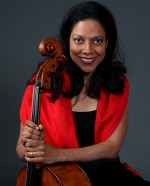Column Name
Title
Astrid Schween (Pre-College ’80; BM ’84, MM ’85, cello) entered Juilliard when she was 7 and didn’t leave until she had her master’s degree, later returning for a few years to teach in the MAP program. Now she’s back in a big way. Last spring, she was named the cellist of the Juilliard String Quartet upon the retirement of Joel Krosnick, who’d been in the ensemble since 1974. Schween, who’s had a long and impressive career with the Lark Quartet, performing and recording all over the world, has also served on the faculties of the University of Massachusetts, Mount Holyoke College, the Hartt School of Music, and the Interlochen and Bowdoin festivals. She also has a thriving solo career including ongoing recital partnerships with celebrated pianists Randall Hodgkinson and Michael Gurt (MM ’82, piano). The J.S.Q. begins its 70th-anniversary season with a concert here on October 17. See the video Snapshot that this was taken from here.
Body
How has Juilliard changed since you were at school here?
It’s incredible. Last spring, I saw President Polisi at a celebration for Joel Krosnick and I looked around and said, “I love what you’ve done with the place!” Of course, there are the beautiful facilities, like the concert halls and dormitory, as well as the curricular changes, which I’ll be delving into more when I’m here teaching. It seems like there’s a better use of space, and it’s much more student friendly now. It’s a nice feeling to be back having experienced so much as a teacher and performer, and to get a second chance at being here and take part in so many new initiatives and find a way to connect with students and perform.
How did you come to be a musician?
Family legend has it that I was taken to a Tanglewood concert when I was very small. We had a picnic blanket, there was a cello soloist, and apparently I was captivated. My father had to carry me on his shoulders back and forth so I could get a closer view. My parents weren’t professional musicians (though my mother was a serious pianist as a child and we always had music in the house), so they didn’t really think of starting a 3-year-old on cello and suggested I start on piano, to which I replied, “I really want a cello!” So, finally, when I was 7, I started cello lessons. My first teacher was H.T. Ma, Yo-Yo’s dad.
The building in which I grew up was on Riverside Drive and the woman who lived directly across the courtyard from my bedroom was the celebrated cello teacher Ardyth Alton (Postgraduate Diploma ’44, cello; faculty 1965–2007). She heard me practicing and when she saw me coming and going with my cello, asked me to come and play for her, and soon afterward, she helped me to prepare for my Pre-College audition.
How would you describe the bond in a string quartet?
It’s a lot like a highly functioning basketball team. There’s a sense of the collective and everybody’s contributing all they have at all times, but those roles change. Sometimes you’re in an initiating position, sometimes you’re on the receiving end, and sometimes you’re on the supporting end. You have to make these decisions nonverbally and instantaneously. Rehearsing prepares the group to make those decisions and create a sense of beauty in the concerts. But that sense of spontaneity and immediacy is primary.
What was the J.S.Q. audition process?
It was a surprise, first of all. I got a call from the quartet [as] they were anticipating Joel Krosnick’s last season, which was such a big deal—he’d been the cellist for 42 years. From my perspective, he eats, sleeps, and breathes quartets, and he’s the person that I most associated with the quartet. They asked if I’d like to read with them and I said, “Yes, I think I can make that work.” They gave me a list of pieces to prepare, we had an audition and then a follow-up audition with some different repertoire. And then they popped the question.





